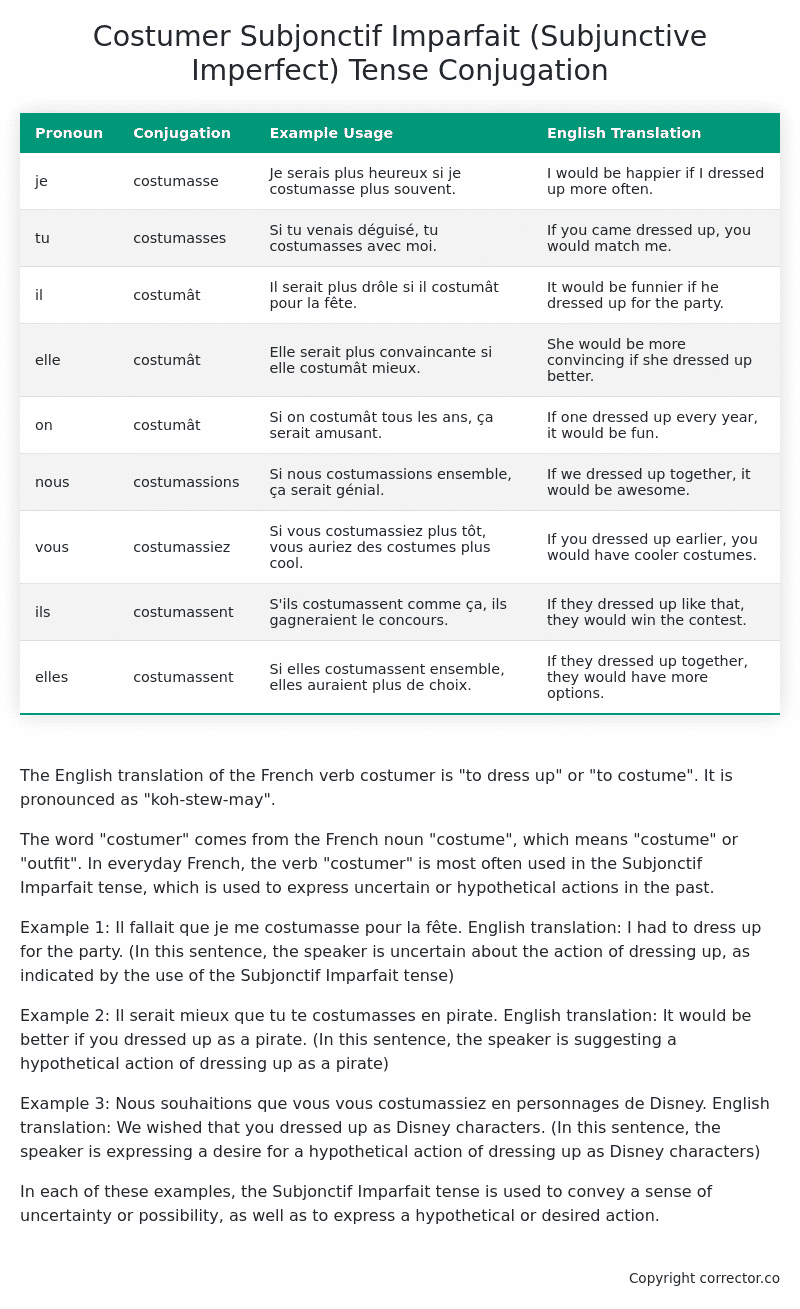Subjonctif Imparfait (Subjunctive Imperfect) Tense Conjugation of the French Verb costumer
Introduction to the verb costumer
The English translation of the French verb costumer is “to dress up” or “to costume”. It is pronounced as “koh-stew-may”.
The word “costumer” comes from the French noun “costume”, which means “costume” or “outfit”. In everyday French, the verb “costumer” is most often used in the Subjonctif Imparfait tense, which is used to express uncertain or hypothetical actions in the past.
Example 1: Il fallait que je me costumasse pour la fête.
English translation: I had to dress up for the party.
(In this sentence, the speaker is uncertain about the action of dressing up, as indicated by the use of the Subjonctif Imparfait tense)
Example 2: Il serait mieux que tu te costumasses en pirate.
English translation: It would be better if you dressed up as a pirate.
(In this sentence, the speaker is suggesting a hypothetical action of dressing up as a pirate)
Example 3: Nous souhaitions que vous vous costumassiez en personnages de Disney.
English translation: We wished that you dressed up as Disney characters.
(In this sentence, the speaker is expressing a desire for a hypothetical action of dressing up as Disney characters)
In each of these examples, the Subjonctif Imparfait tense is used to convey a sense of uncertainty or possibility, as well as to express a hypothetical or desired action.
Table of the Subjonctif Imparfait (Subjunctive Imperfect) Tense Conjugation of costumer
| Pronoun | Conjugation | Example Usage | English Translation |
|---|---|---|---|
| je | costumasse | Je serais plus heureux si je costumasse plus souvent. | I would be happier if I dressed up more often. |
| tu | costumasses | Si tu venais déguisé, tu costumasses avec moi. | If you came dressed up, you would match me. |
| il | costumât | Il serait plus drôle si il costumât pour la fête. | It would be funnier if he dressed up for the party. |
| elle | costumât | Elle serait plus convaincante si elle costumât mieux. | She would be more convincing if she dressed up better. |
| on | costumât | Si on costumât tous les ans, ça serait amusant. | If one dressed up every year, it would be fun. |
| nous | costumassions | Si nous costumassions ensemble, ça serait génial. | If we dressed up together, it would be awesome. |
| vous | costumassiez | Si vous costumassiez plus tôt, vous auriez des costumes plus cool. | If you dressed up earlier, you would have cooler costumes. |
| ils | costumassent | S’ils costumassent comme ça, ils gagneraient le concours. | If they dressed up like that, they would win the contest. |
| elles | costumassent | Si elles costumassent ensemble, elles auraient plus de choix. | If they dressed up together, they would have more options. |
Other Conjugations for Costumer.
Le Present (Present Tense) Conjugation of the French Verb costumer
Imparfait (Imperfect) Tense Conjugation of the French Verb costumer
Passé Simple (Simple Past) Tense Conjugation of the French Verb costumer
Passé Composé (Present Perfect) Tense Conjugation of the French Verb costumer
Futur Simple (Simple Future) Tense Conjugation of the French Verb costumer
Futur Proche (Near Future) Tense Conjugation of the French Verb costumer
Plus-que-parfait (Pluperfect) Tense Conjugation of the French Verb costumer
Passé Antérieur (Past Anterior) Tense Conjugation of the French Verb costumer
Futur Antérieur (Future Anterior) Tense Conjugation of the French Verb costumer
Subjonctif Présent (Subjunctive Present) Tense Conjugation of the French Verb costumer
Subjonctif Passé (Subjunctive Past) Tense Conjugation of the French Verb costumer
Subjonctif Imparfait (Subjunctive Imperfect) Tense Conjugation of the French Verb costumer (this article)
Subjonctif Plus-que-parfait (Subjunctive Pluperfect) Tense Conjugation of the French Verb costumer
Conditionnel Présent (Conditional Present) Tense Conjugation of the French Verb costumer
Conditionnel Passé (Conditional Past) Tense Conjugation of the French Verb costumer
L’impératif Présent (Imperative Present) Tense Conjugation of the French Verb costumer
L’infinitif Présent (Infinitive Present) Tense Conjugation of the French Verb costumer
Struggling with French verbs or the language in general? Why not use our free French Grammar Checker – no registration required!
Get a FREE Download Study Sheet of this Conjugation 🔥
Simply right click the image below, click “save image” and get your free reference for the costumer Subjonctif Imparfait tense conjugation!

Costumer – About the French Subjonctif Imparfait (Subjunctive Imperfect) Tense
Formation
Common Everyday Usage Patterns
Interactions with Other Tenses
Subjonctif Présent
Indicatif Passé Composé
Conditional
Conditional Perfect
Summary
I hope you enjoyed this article on the verb costumer. Still in a learning mood? Check out another TOTALLY random French verb conjugation!


